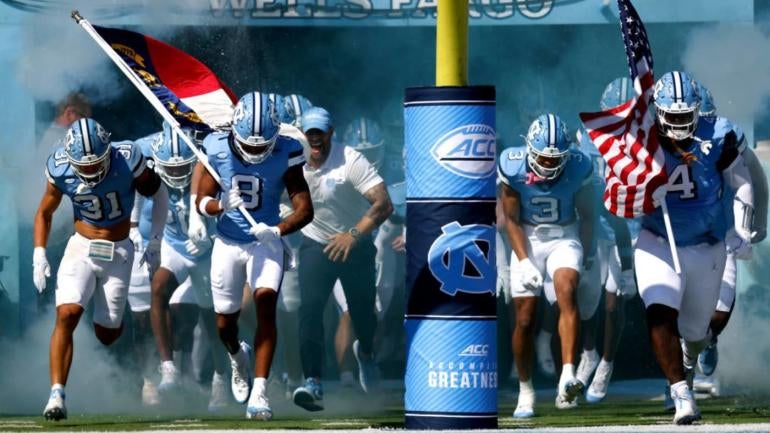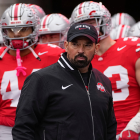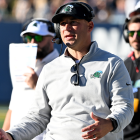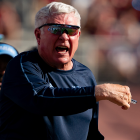
North Carolina fired Mack Brown on Tuesday, setting in motion a coaching carousel that has been lacking movement at the power conference level. While the American Athletic Conference already has a half-dozen coaching changes in progress, and CBS Sports insiders expect a robust market for power conference coordinators and assistants, the apparent cooling of multiple hot seats over the past month suggests a quiet year for change at major programs.
But North Carolina moving on from Brown puts the program in an unfamiliar position. For the first time in the modern era, the national coaching carousel runs through Chapel Hill.
This is not a school that has ever held all the cards when it comes to football searches. Thanks to the work of Brown's second stint, however, North Carolina football is as healthy and attractive a job as it has been in decades. Brown raised the floor, ushered the fan base and donors into the NIL era, and repaired relationships throughout the state that had become fractured during previous tenures. He will end the "Mack 2.0" era with six consecutive bowl-eligible seasons, an ACC runner-up finish in 2022, and an Orange Bowl appearance in 2020.
In comparison, previous North Carolina football hires have inherited:
- A program that won just five games combined across 2017-18
- A program in the midst of NCAA scandal with sanctions on the way
- A program that had gone 27-45 across six seasons with just two bowl appearances
- A program that had lost its footing from the highs of the Mack Brown 1.0 era -- 1999 was its first losing season since 1989.
Every coach hired since Brown's exit (which led to the promotion of defensive coordinator Carl Torbush) was tasked with fixing major issues within the program. By moving on from Mack Brown in the 2024-25 offseason, North Carolina is hitting the coach market in the best condition it has been in during the modern era.
North Carolina may be doing so with less competition than it has ever faced--or may ever face--in the coaching carousel marketplace.
It has been suggested that many hot-seat situations cooled in recent weeks because of the upcoming House ruling and the uncertain financial future of revenue sharing. That may be the case, and if so, North Carolina is taking a calculated risk. If the school had let Brown's tenure extend into 2025 only to make this same move next season, perhaps more clarity about the financials of college sports would have made schools less hesitant to fire their coaches. If North Carolina entered the marketplace in 2025, it could have been competing with multiple SEC programs for top candidates.
The North Carolina job is a strong position that would attract interest from top candidates. Top SEC coordinators and rising coaches were all mentioned as potential targets before Butch Davis was hired in 2006, but questions remain about the actual candidacy of those individuals given the timeline of the coaching change. John Bunting was fired midseason and allowed to finish the year, while Davis, who was not coaching at the time, was announced as the next coach on Nov. 13, 2006.
Now, athletic director Bubba Cunningham and the university leadership get to hold a proper search, within a normal timeframe, with a job to offer that is as attractive as it has been in decades -- and, for now, the best available job in the country. That's an enormous opportunity and a pivot point for the school.
Coaches often talk about building programs by following a progression: "lose big, then lose small, then win small, and finally win big." Outsiders often discuss the potential of North Carolina football, citing the rising level of talent in the state, the school's national brand, and a passionate fan base familiar with celebrating big wins in other sports. The reality, however, is that most of the Tar Heels' coaching hires in the modern era have been restoration jobs to bring the program back to its historical average -- winning about 55% of its games.
The expectation, based on 120-plus years of North Carolina football, has been to win more games than you lose and, once every four to five years, produce a team that contends for conference championships and a top-25 finish.
If North Carolina wants more than that, this is an opportunity to bring in a qualified candidate who doesn't have to start over with the "lose big" or "lose small" stages of building a successful program. Thanks to the work of Mack Brown's second tenure, North Carolina football doesn't need to be rebuilt to its historical 55% average--because that's where the next head coach will begin.
Considering the health of the program and the apparent lack of competition, there is no excuse for North Carolina not to make a great hire who can lead the team into a new era of college athletics. That's the calculated risk North Carolina is taking by making a change while others wait for things to settle. This is a job that hasn't been the best available before and might not be again.

















